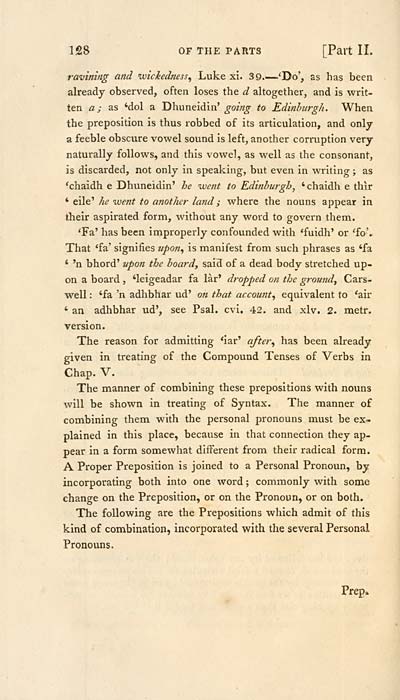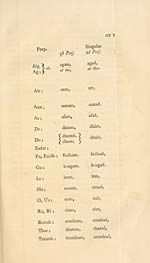Download files
Complete book:
Individual page:
Thumbnail gallery: Grid view | List view

128 OF THE PARTS [Part II.
ravining and luichdjiess^ Luke xi. 39 — 'Do', as has been
already observed, often loses the d altogether, and is writ-
ten a; as *dol a Dhuneidin' going to Ediiiburgh. When
the preposition is thus robbed of its articulation, and only
a feeble obscure vowel sound is left, another corruption very
naturally follows, and this vowel, as well as the consonant,
is discarded, not only in speaking, but even in writing ; as
*chaidh e Dhuneidin' he wetit to Edinburgh, 'chaidh e thir
' eile' he went to another Icmd ; where the nouns appear in
their aspirated form, without any word to govern them.
'Fa' has been improperly confounded with 'fuidh' or 'fo'..
That 'fa' signifies upon^ is manifest from such phrases as 'fa
' 'n bhord' upon the board, said of a dead body stretched up-
on a board , 'leigeadar fa làr' dropped on the ground. Cars-
well : 'fa 'n adhbhar ud' on that account, equivalent to *air
' an adhbhar ud', see Psal. cvi, 42. and xlv. 2. metr.
version.
The reason for admitting *iar' after, has been already
given in treating of the Compound Tenses of Verbs in
Chap. V.
The manner of combining these prepositions with nouns
will be shown in treating of Syntax. The manner of
combining them with the personal pronouns must be ex-
plained in this place, because in that connection they ap-
pear in a form somewhat different from their radical form.
A Proper Preposition is joined to a Personal Pronoun, by
incorporating both into one word ; commonly with some
change on the Preposition, or on the Pronoun, or on both.
The following are the Prepositions which admit of this
kind of combination, incorporated with the several Personal
Pronouns.
Prep.
ravining and luichdjiess^ Luke xi. 39 — 'Do', as has been
already observed, often loses the d altogether, and is writ-
ten a; as *dol a Dhuneidin' going to Ediiiburgh. When
the preposition is thus robbed of its articulation, and only
a feeble obscure vowel sound is left, another corruption very
naturally follows, and this vowel, as well as the consonant,
is discarded, not only in speaking, but even in writing ; as
*chaidh e Dhuneidin' he wetit to Edinburgh, 'chaidh e thir
' eile' he went to another Icmd ; where the nouns appear in
their aspirated form, without any word to govern them.
'Fa' has been improperly confounded with 'fuidh' or 'fo'..
That 'fa' signifies upon^ is manifest from such phrases as 'fa
' 'n bhord' upon the board, said of a dead body stretched up-
on a board , 'leigeadar fa làr' dropped on the ground. Cars-
well : 'fa 'n adhbhar ud' on that account, equivalent to *air
' an adhbhar ud', see Psal. cvi, 42. and xlv. 2. metr.
version.
The reason for admitting *iar' after, has been already
given in treating of the Compound Tenses of Verbs in
Chap. V.
The manner of combining these prepositions with nouns
will be shown in treating of Syntax. The manner of
combining them with the personal pronouns must be ex-
plained in this place, because in that connection they ap-
pear in a form somewhat different from their radical form.
A Proper Preposition is joined to a Personal Pronoun, by
incorporating both into one word ; commonly with some
change on the Preposition, or on the Pronoun, or on both.
The following are the Prepositions which admit of this
kind of combination, incorporated with the several Personal
Pronouns.
Prep.
Set display mode to: Large image | Transcription
Images and transcriptions on this page, including medium image downloads, may be used under the Creative Commons Attribution 4.0 International Licence unless otherwise stated. ![]()
| Early Gaelic Book Collections > Blair Collection > Elements of Gaelic grammar > (158) |
|---|
| Permanent URL | https://digital.nls.uk/79041871 |
|---|
| Description | A selection of books from a collection of more than 500 titles, mostly on religious and literary topics. Also includes some material dealing with other Celtic languages and societies. Collection created towards the end of the 19th century by Lady Evelyn Stewart Murray. |
|---|
| Description | Selected items from five 'Special and Named Printed Collections'. Includes books in Gaelic and other Celtic languages, works about the Gaels, their languages, literature, culture and history. |
|---|

